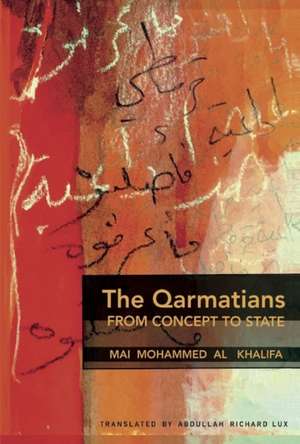The Qarmatians, from Concept to State: Volume 1
Autor Mai Mohammed Al Khalifa Traducere de Abdullah Richard Luxen Limba Engleză Hardback – 30 dec 2019
Preț: 238.29 lei
Nou
45.64€ • 47.02$ • 38.23£
Carte indisponibilă temporar
Specificații
ISBN-10: 1543981178
Pagini: 574
Dimensiuni: 160 x 234 x 41 mm
Greutate: 1.09 kg
Editura: Neil Investments Inc
Descriere
In The Qarmatians From Concept to State, author Mai Mohammed Al Khalifa provides a fascinating reinvestigation of 7th-10th century Islamic and Middle East history in Arabia, Iraq, Syria, Yemen and Bahrain. Up until recent times, Bahrainis referred to their madhab (religious school) and self-identified as 'Abu Sa'idis' in reference to Abu Sa'id al-Jannabi (d. 913 CE), founder of the independent Qarmatian state in Bahrain. Based on the principle of al-ulfah--'brotherly love' and camaraderie, that polity, which persisted for a century-and-a-half (ca., 899-1078 CE), provided the world with a unique political and socio-economic model of Islam. Most frequently remembered for their bands of fast-roving horsemen committed to a Spartan, desert code and Abu Tahir al-Jannabi's (d. 944 CE) infamous seizure of the hajar al-aswad ('black stone') from the ka'bah in Mecca, the Qarmatians merit serious academic consideration for the fact that the viable states and forms of equitable human society evolved under Hamdan Qarmat in al-Kufah and Abu Sa'id al-Jannabi in Bahrain remain unique in the annals of history. Their mode of living presaged vital concerns of our era including: socialization of wealth and means of production; gender-equality; group-/ collective decision making (under the Islamic democratic principle of shura); and abolition of private property, in a system of social status and merit according to ethical conduct and service to community. Meticulously detailed research and a vivid history covering the rise of forms of state in Iraq, Yemen and Bahrain lay open to question common assumptions about 'Islam' and Islamic historiography. A uniquely Ba?raini perspective raises provocative possibilities that the political and socio-economic model of the Qarmatians might have been closer than anything under the Umayyads or 'Abbasids to the original Islam and initial dar al-hijrah ('house of emigration') of the first Muslim community established by the Prophet Muhammad in Medina (Yathrib), ca. 622-632 CE. At conceptual and philosophical levels, early Isma?ili-Qarma?ian doctrine and derivative projects of state are, arguably, the best expressions 'on the ground' of the principles of the Risa?il of the Ikhwan al-Safa' (The Treatises of the 'Brethren of Purity'), which summarized the known scientific, mathematical, philosophical and religious knowledge of the ancient world as collected, emended and translated under the Bayt al-Hikmah ('House of Wisdom'). At the level of credo, the Qarmatians may have drawn inspiration from the greatest Sufi of all time, al-Husayn bin Mansur al-Hallaj (d. 922 CE). In the integration of science, philosophy and religion with parameters for equitable and egalitarian human coexistence the Qarmatians merit renewed attention as the society they evolved may have indeed reflected the legal intents (maqasid al-shari'ah) of Islamic law in a highly progressive form, unprecedented up until today. This book makes meaningful contribution to the field in its depth of analysis and reliance on previously overlooked Bahraini sources. The author's dispassionate and unbiased approach cracks the fa ade of dubious historiographical suppositions and accretions and sheds new light in a highly politicized domain where politics and dynastic intrigue have frequently been confounded with Islam. Readers are poised to revisit, witness and ponder a new reading of the history of the Qarmatians and the formative period of Islam itself with an open mind.Author Mai Mohammed Al Khalifa, historian and founder of the Shaikh Ebrahim bin Mohammed Al-Khalifa Center for Culture and Research, is the Chairperson of the Board of the Arab Regional Centre for World Heritage and the Minister of Culture of Bahrain.Translated by Abdullah Richard Lux, professor of Arabic, former Director of Translation at the Centre for Arab Unity Studies (CAUS) in Beirut and previous Executive Editor of Contemporary Arab Affairs (Routledge, UK).
